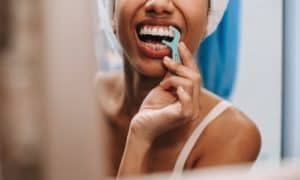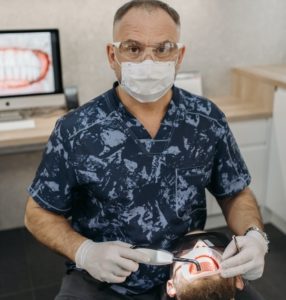
Fabulous Fruits
The USDA recommends that adults get two servings of fruit a day, the American Heart Association recommends four to five servings, and the CDC recommends 1-2 cups a day for kids, making fruit a pretty essential part of everyone’s diet. Fruits are packed with vitamins and can be an excellent snack. However, not all fruits are optimal in the same way, especially when it comes to oral health.
Sugars & Acids
Fruits are often considered a healthy treat. After all, they do contain plenty of vitamins, minerals, nutrients, and antioxidants. But when it comes to teeth, some fruits are better than others mainly because of the sugar or acid content. Sugars and acids can wreak havoc on tooth enamel and weaken it. Once the enamel erodes it can lead to several oral concerns, including an increased risk of decay. Keep an eye for the following signs of enamel erosion:
If you notice any symptoms of enamel erosion, contact your dentist in Canton.
What Fruit Can Help Teeth?
Now, we aren’t suggesting that you forego fruits. They are a necessary part of any healthy diet and their whole-health benefits are well worth it. However, when it comes to making choices that can be both good for your body and for your teeth, consider options that contain a lot of water such as:
Be Wary of These Fruits
Other types of fruit aren’t as good for teeth as others but may still provide necessary nutrients, so it’s important to find balance in what you eat. Some fruits that may be tougher on your teeth include:
Moderation is Key
As we’ve mentioned before, eating fruit is still an important part of making sure that your body gets all of the nutrients it needs. But your dentist in Canton would suggest enjoying fruits high in sugar or highly acidic in moderation, and even rinsing your mouth out with water when you’re done eating. Another important note that relates to juice, sipping fruit juice can expose your teeth to even more sugars and acids than whole, raw fruits. Whenever possible, choose natural fruits over juice.
Accepting new patients at our dental offices in Ann Arbor, Canton, Farmington Hills, and Livonia.

String Floss
Traditional string floss is economical and easy for most people to use. Dental hygienists explain that properly flossing with string floss requires the following steps:
Now, some dental professionals say that this flossing method is most effective at removing debris between the teeth and below the gum line. However, some people may find the instructions for string floss too complicated and may not be able to finesse the dexterity needed to properly clean their teeth. Those individuals may find a water flosser useful.
Water Flossers
Water flossers are an effective alternative to string floss, and the American Dental Hygienists’ Association recommends them as more effective than traditional floss. But there are some downsides. Water flossers are more expensive than string floss, can take some practice to get used to, and can take up space on your bathroom counter. However, a water flosser may be the right choice for people with arthritis, braces, or who have trouble maneuvering string floss. Additionally, water flossers may benefit anyone who has gum recession or sensitive teeth.
The Best Floss
No matter which type of floss you use, it’s important to do just that – use it! Flossing helps clean the parts of your teeth a toothbrush can’t reach. Your dentist in Ann Arbor recommends that everyone floss once a day, every day for optimal oral health.
If you have questions about which floss is right for you, talk with a dentist in Ann Arbor.
Welcoming new patients at our dental offices in Ann Arbor, Canton, Farmington Hills, and Livonia.

Common Reasons for Filling Pain
There are some reasons why a patient might have some discomfort after a dental treatment that can include:
Even if none of these apply to you and your oral health, there’s a chance you might still feel a little pain after your filling is complete, and that is totally normal. If you’re at all concerned about how you’re feeling, you can always reach out to your Farmington Hills dentist for some assistance.
Fillings and Feeling the Pressure
There’s a pretty simple reason why you might have pain after you get a tooth filled due to a cavity, and its pressure. After your filling is permanently in place, the piece of your tooth that was damaged by bacteria is now filled in, adding new pressure to the area. This can change how air and saliva move across your tooth, causing sensitivity.
Taking on Tooth Sensitivity
Tooth sensitivity, especially following dental work, can be annoying. Here are some things you can try at home to help relieve your sensitivity:
You’ll also want to avoid whitening toothpaste and other similar products because they can make your sensitive teeth even worse.
The right thing to do if you’re experiencing any pain, discomfort, or sensitivity is to schedule a visit right away at our Farmington Hills dental office as soon as possible. We can help you feel better and determine what’s causing your issues so we can get to the root of your problems or pain.
Welcoming new patients at our dental offices in Ann Arbor, Canton, Farmington Hills, and Livonia.

Do I Have Tonsil Stones?
If you look in the back of your throat where your tonsils are and see tiny white bumps or clusters, those are generally tonsil stones. They love to form deep in the pockets in your throat tissue because they come from bacteria and other debris, which can harden over time, creating the white bumps you see in the back of your throat that can be uncomfortable. Tonsil stones are likely to occur due to common bacterial and viral infections like strep throat and the influenza virus.
Are There Ways to Get Rid of Tonsil Stones?
Tonsil stones are best treated by your Canton dentist and possibly your primary care physician if you have a bacterial or viral infection. If you’re someone who constantly gets sore throats, painful inflammation, and tonsil stones, it might be time to talk about a tonsillectomy or removal of your tonsils altogether.
If you or someone in your family gets a tonsil stone, there are some things you can do to alleviate any discomfort and maybe even keep them from returning altogether! A short-term solution could be antibiotics, as they’re effective at lowering bacterial counts that play an essential role in developing tonsil stones. But taking antibiotics long-term is not good for you and your body. Give these tips a try:
Are tonsil stones making your life miserable? Is your child struggling with constant sore throats? You can schedule an appointment at our dental office in Canton to talk with us. We can create a plan to help you get rid of annoying tonsil stones for good. We look forward to hearing from you! Call today.
Welcoming patients at all of our dental offices in Ann Arbor, Canton, Farmington Hills, and Livonia.

More Sleep. Less Sugar.
Who would have thought that all you have to do to cut back on sugar is to sleep more? It almost sounds too good to be true, right? Well, the research can’t be wrong, and it says that when you sleep less than five hours each night, you might gravitate towards sugar drinks for an energy boost. If you’re feeling sluggish, try swigging water instead, it will help you feel better without a sugar crash later and help protect your pearly whites.
Provide Sugarless or Reduced Sugar Options
Are you entertaining this year? Think about yourself and your guests in terms of sweetness overload. If you’re putting out a candy dish or two, try sugar-free options and those that contain Xylitol. If you’re in charge of cooking or baking, consider cutting back on the sugar or using a healthier alternative. Your smile, your body, and your guests will thank you!
Remember Your Best Decay Defense
Your Ann Arbor dentist will be the first to tell you that good ol’ brushing and flossing are the best ways to get rid of possible sugar build-up on your teeth that can lead to cavities. Remember to floss once and brush twice a day for two minutes — that’s all it takes to keep teeth clean and healthy. It’s essential to brush and floss after indulging in decadent desserts.
If you really want to keep your smile healthy and help your family, consider giving people the gift of a healthy smile this holiday season with some new, cool dental tools like toothbrushes, toothpaste, and floss. It’s surely a gift that will get used, whether they want to admit it or not! If you need an exam or have questions about your oral health, please schedule a consultation today at our dental office in Ann Arbor! We are here to help you.
Accepting new patients at all of our dental offices in Ann Arbor, Canton, Farmington Hills, and Livonia.

Symptoms of Tooth Sensitivity
We’ve already covered the primary symptom of tooth sensitivity — those quick, uncomfortable bursts of pain. It’s completely normal to feel this after eating something hot or cold. But when tooth sensitivity happens at these other times, it’s probably wise to see your dentist.
Causes of Sensitive Teeth
Many people who experience sensitive teeth will most likely have decreased amounts of enamel protection. Enamel is the layer of the tooth that protects the inner workings of tooth anatomy, including the roots and nerves. However, many things can cause enamel erosion and allow those nerves to become exposed. The result is the feeling of tooth sensitivity. Some of the main causes of enamel erosion include:
Now, even though enamel erosion is a common problem and a common reason behind tooth sensitivity, there are some other potential causes that you should be aware of.
If you’re experiencing tooth sensitivity, it’s always best to see your dentist in Farmington Hills to find out what’s causing the pain in the first place. If you wait, pain can increase, and the problem can get worse.
Treating Sensitive Teeth
When it comes to treating sensitive teeth, your dentist needs to know what’s causing it first. Then your treatment plan will be catered to your specific needs.
If your sensitivity is caused by a broken filling or older dental restoration, your dentist will most likely want to replace it. This may require a new filling, a crown, inlay, or onlay.
Nobody wants to hear that they may need a root canal, but this treatment has an unwarranted bad reputation. If your dentist in Farmington Hills recommends a root canal, you can relax knowing that this treatment will relieve your pain, not cause it.
Sensitivity that’s caused by worn down enamel or gum recession may be treated with fluoride at your dental appointments or your dentist may recommend a specific toothpaste or rinse. Most of the time, you should be using a soft toothbrush, but especially if you have sensitive teeth.
While tooth sensitivity is incredibly common, it’s also incredibly important to mention it to your dentist. Many times treatment is easy and may only require a minor change in your oral hygiene routine. But even if you do need dental treatment, rest assured that this will get you relief.
Laurich Dentistry has four dental offices to best serve you, including in Ann Arbor, Canton, Farmington Hills, and Livonia.

Candy is Ok… In Moderation
We know that all kids want to come home after a long night of trick or treating, dump their candy haul on the floor, and start chowing down on their favorite sweets. We’re not here to take that thrill away, but we do encourage you to help your child limit their candy intake. Starting on Halloween night, allow your kiddo to pick a few of their favorites to enjoy that day. In the days following, don’t let pails of candy sit out for easy picking. Instead, allow your child to pick a few pieces of candy to enjoy at a specific time of day to limit constant snacking and teeth’s constant exposure to sugar.
Drink Water
Drinking water during and after eating sweet foods can help wash away leftover sugars that could otherwise lead to cavities. But that’s not all. Water can also help neutralize plaque acid which can further protect teeth.
Brush Well, Brush Often
You already know how important it is for your kids to take excellent care of their teeth at home in between visits to their dentist in Ann Arbor. During holidays like Halloween, it’s even more important. Make sure your kids are brushing their teeth at least twice a day for a full two minutes each time. Kids under 8 may need help to make sure they’re cleaning their teeth properly. It’s also important to encourage your kid to brush their teeth after they snack on anything sugary, including their Halloween candy.
Trade In “Bad” Candy
There are some candies that are worse for teeth than others, and you may find it helpful to swap out these bad candies for something else. You can use money (a dime per piece, perhaps?), toys, or extra TV or electronics time. Consider trading in sticky, hard, or sour candy.
See Your Dentist in Ann Arbor
Cavities can be scary, but there are ways to prevent them. Sealants and fluoride treatments from your dentist can help protect teeth from scary sugar bugs. Make sure your kids are visiting their dentist regularly (at least every six months) to catch any problems early and get the preventive treatment they need to grow a happy, healthy smile.
If you’re looking for more tips on how to have a healthy Halloween, head over to the American Academy of Pediatric Dentistry (AAPD). They have tons of holiday-specific guides to help.
We’re always welcoming new patients at all of our dental offices in Ann Arbor, Canton, Farmington Hills, and Livonia.

Don’t Wait
It’s not uncommon for patients to hold off on using their dental insurance just in case something happens. However, this plan can backfire in a few ways.
Most dental insurance starts on January 1st and ends on December 31st. This isn’t always the case so make sure to check with your provider. However, this means that you must use your maximum allowance during those 12 months or you’ll lose it.
Patients usually pay for coverage either through their employer or on their own. Either way, dental insurance typically isn’t free. But if you pay for dental insurance and don’t use the benefits, your investment was wasted.
The best way to use your dental insurance benefits is to see your dentist in Canton at least every six months for professional cleanings, x-rays, and exams. These appointments can help catch problems early when they’re less expensive to fix and keep other big problems from happening.
Overlapping Treatment
Dental benefits don’t necessarily have to be used on preventive care alone. In fact, some patients choose to use their maximums to help cover the cost of transformative cosmetic dentistry, such as veneers, or restorative dentistry like dental implants or crowns. If that’s the case, you may be able to start treatment at the end of the year using this year’s benefits and finish at the beginning of next year using 2022 benefits. Your dentist can help you determine the best way to maximize your benefits on the treatment you desire.
Flex Savings Account
Even if you don’t have traditional dental insurance, you may have a Flex Savings Account (FSA) that you can use toward dental care. However, like dental insurance, FSAs often expire on January 1st, so make sure you use the money you’ve already invested.
Do you have unused dental benefits that will expire once the clock hits midnight on January 1, 2022? If so, schedule an appointment with your dentist in Canton today!
We have dental offices in Ann Arbor, Canton, Farmington Hills, and Livonia to better serve you.

Following wisdom teeth surgery, it’s crucial to follow your dentist’s instructions to promote healing and minimize discomfort. Below are some common tips, but it’s still wise to talk with your dentist in Livonia about your specific after-care instructions.
Minimize Bleeding
There will be some bleeding after having your wisdom teeth taken out. But don’t worry, this is completely normal. To help minimize the bleeding, apply pressure on your wound using clean gauze. The gauze may have to be replaced a few times daily, and it’s important that you wash your hands thoroughly beforehand to avoid introducing bacteria into your mouth.
Reduce Swelling
You may not notice much or any immediate swelling after surgery, and that’s normal too. Sometimes you won’t swell up for a day or two. But it’s still important to get ahead of it by using ice packs. Apply ice to the outside of your cheeks for 20 minutes, then remove it for 20 minutes. Make sure to wrap the ice in a t-shirt or thin towel so the ice pack is never in direct contact with your skin.
Eat & Drink Wisely
Your dentist in Livonia will recommend sticking with soft foods a few days following having your wisdom teeth removed. Food, such as oatmeal, warm (not hot!) soup, mashed potatoes, applesauce, or scrambled eggs are all good options. Also, make sure you drink plenty of water to keep yourself hydrated, just avoid sipping from a straw as this can cause damage to the surgical site.
When it comes to healing from wisdom teeth surgery, there are some things that you may normally do that you should avoid, at least for a little while.
Rinse Aggressively
While your dentist may recommend rinsing your mouth out with warm salt water a few times a day to reduce swelling, you should take it easy. Swishing too aggressively can cause more harm than good and may even cause you to start bleeding again.
Smoke
Not only does smoking require a sucking motion similar to drinking out of a straw, but it can also slow your healing. Smoking is also one of the main causes of dry socket, an infection that can cause serious pain for several days.
Exercise
This may be one of the few times you’ll hear a medical professional tell you not to exercise, but any type of strenuous activity such as exercise following wisdom teeth surgery can increase bleeding and swelling. You should do your best to limit exercise as well as heavy lifting for 3-4 days after surgery or until you’re cleared by your dentist in Livonia.
Wisdom teeth removal is an incredibly common procedure, but we understand that you may feel nervous. Talking with your dentist about any questions you have, as well as following their post-operative instructions, can relieve some of your concerns and get you healed up in no time.
We’re always welcoming new patients at our dental offices in Ann Arbor, Canton, Farmington Hills, and Livonia.

Avoiding Floss
Flossing is one of the most important parts of good dental care. However, one study showed that more than 45% of people floss only weekly, and 58% of people don’t floss at all! That’s a whole lot of missed bacteria that can increase the risk of cavities and other dental problems. In fact, when you don’t floss your teeth, you miss out on cleaning nearly 40% of tooth surfaces. This is why it’s so important to floss in between each and every tooth every day.
Snapping Your Floss
When it comes to flossing, there’s a proper technique that should be followed to not only clean your teeth but to do so in a way that doesn’t cause damage. One of the main things patients do that can cause damage is snap floss between teeth instead of gliding it gently in and out. While snapping floss might be a convenient way to get the floss in between each tooth, it can cause micro-tears in the gum tissue. Over time, these tears can lead to pockets of infection within the gums.
Brushing Then Flossing
It’s not uncommon for patients to floss after they brush their teeth. But research published by the Journal of Periodontology suggests that flossing then brushing may be the best way to remove plaque and bacteria. If you brush your teeth first and get a squeaky-clean mouth, then decide to remove bacteria from between teeth by flossing, you might just put bacteria from your mouth back onto your teeth.
Brushing Too Hard
Outside of flossing mistakes, there are some definite brushing mistakes that your dentist in Farmington Hills sees every day. One of the most common is brushing your teeth too hard. For best results, don’t brush with pressure, and there’s no need to scrub. Simply hold your toothbrush at a 45-degree angle and gently move it in circular motions over your teeth. This will thoroughly clean your teeth without damaging the enamel or gums.
Brushing Too Often
You should brush your teeth twice a day, ideally in the morning and before bed. While there may be times where you feel like you need to brush more, know that brushing too much can actually harm dental health by causing enamel erosion and leading to teeth sensitivity. Stick to brushing twice a day for two minutes each time.
Skipping Dental Appointments
Besides taking care of your teeth at home, you also need to see your dentist in Farmington Hills twice a year for preventive checkups and professional dental cleanings. Missing regular dental checkups not only puts your teeth at risk but can also increase your chances of developing gum disease.
It’s important to take care of your teeth in order to prevent dental problems such as cavities and gum disease. The best way to do that is by brushing properly twice a day, flossing thoroughly once a day, and seeing your dentist in Farmington Hills every six months. If you’re overdue for a dental appointment, schedule an appointment today!
We’re always welcoming new patients at our dental offices in Ann Arbor, Canton, Farmington Hills, and Livonia.